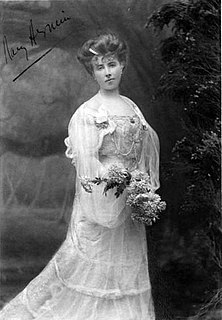A Quote by Charles Spurgeon
I would not choose to go where I would be afraid to die, nor could I bear to live without a good hope for hereafter.
Related Quotes
I would like to die peacefully with Thomas Tallis on my iPod before the disease takes me over and I hope that will not be for quite some time to come, because if I knew that I could die at any time I wanted, then suddenly every day would be as precious as a million pounds, if I knew that I could die, I would live. My life, my death, my choice.
For I'm afraid of loneliness; shiveringly, terribly afraid. I don't mean the ordinary physical loneliness, for here I am, deliberately travelled away from London to get to it, to its spaciousness and healing. I mean that awful loneliness of spirit that is the ultimate tragedy of life. When you've got to that, really reached it, without hope, without escape, you die. You just can't bear it, and you die.
When my grandmother died, I realized that even if I had millions of dollars, I couldn't find her anywhere on earth. My next thought was that I would die. I looked at my life and thought, "I'm afraid to die." I concluded that whether I was afraid or not, I would die. It was one of the most important crossroads in my life, once I realized that no matter what, I would do this thing, the next step was to think, "If I am going to do the most difficult and frightening thing - dying - is it possible that I could do some difficult and impossible things that are good?"
All men and women are born, live, suffer and die; what distinguishes us one from another is our dreams, whether they be dreams about worldly or unworldly things, and what we do to make them come about... We do not choose to be born. We do not choose our parents. We do not choose our historical epoch, the country of our birth, or the immediate circumstances of our upbringing. We do not, most of us, choose to die; nor do we choose the time and conditions of our death. But within this realm of choicelessness, we do choose how we live.
...we are not without hope of salvation, nor is it at all the right time for us to despair. All our life is a season of repentance, for God 'desires not the death of the sinner', as it is written, 'but that the wicked turn from his way and live' (cf. Ez. 33:11 LXX). For, if there were no hope of turning back, why would death not have followed immediately on disobedience, and why would we not be deprived of life as soon as we sin? For where there is hope of turning back, there is no room for despair.
We may live without poetry, music and art; We may live without conscience, and live without heart; We may live without friends; we may live without books; But civilized man cannot live without cooks. . . . He may live without books,-what is knowledge but grieving? He may live without hope,-what is hope but deceiving? He may live without love,-what is passion but pining? But where is the man that can live without dining?
There seems to be something in the zeitgeist, and maybe it's a function of - I'm no analyst, nor am I a psychologist - when you look at things and say, What if I could go back and change things? I think we live in a world right now where people are asking those questions a lot. What if we could go back and change what we did? How would we change the way we handled things in the Middle East, and how would we change things with the banking industry, and how would we change economic and educational issues?



































